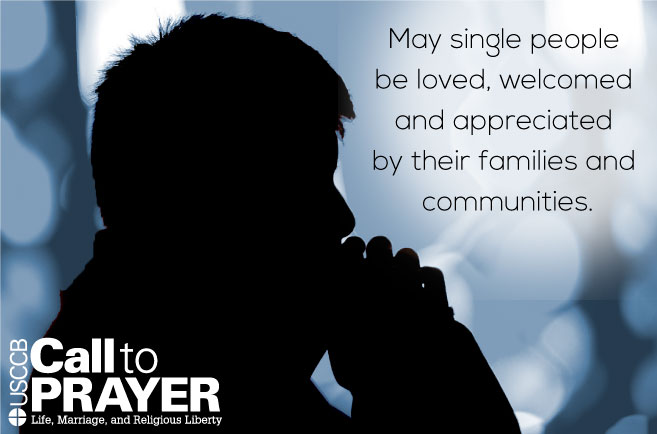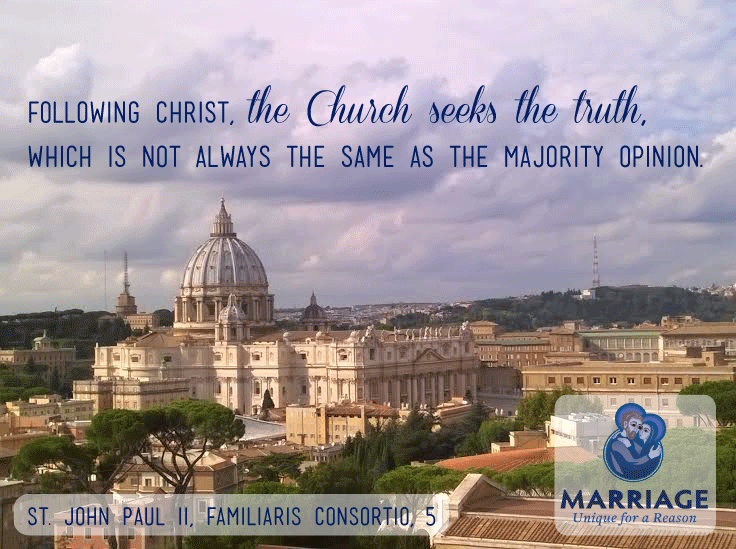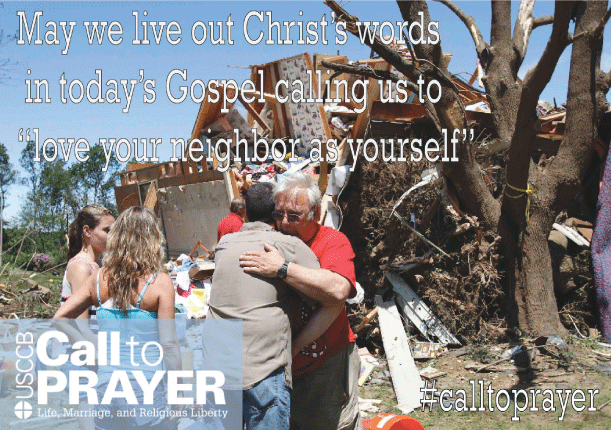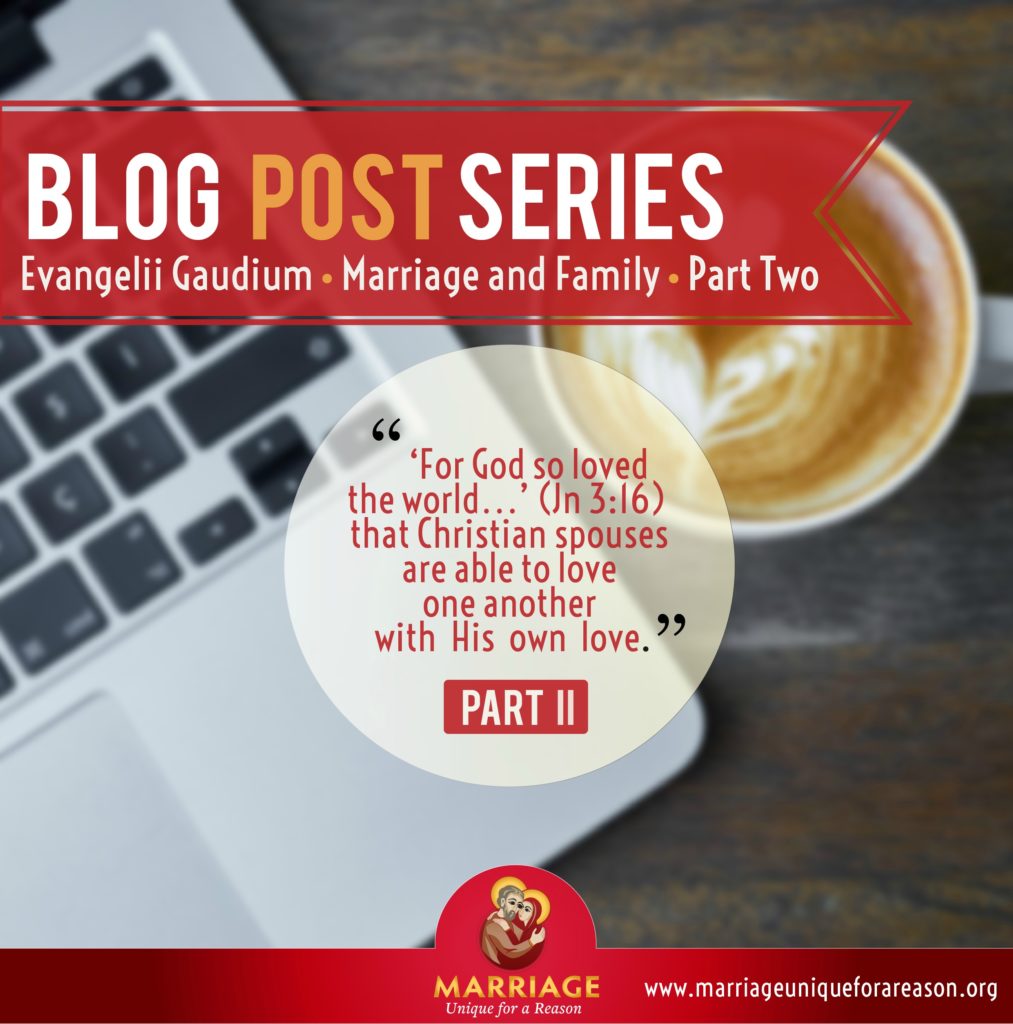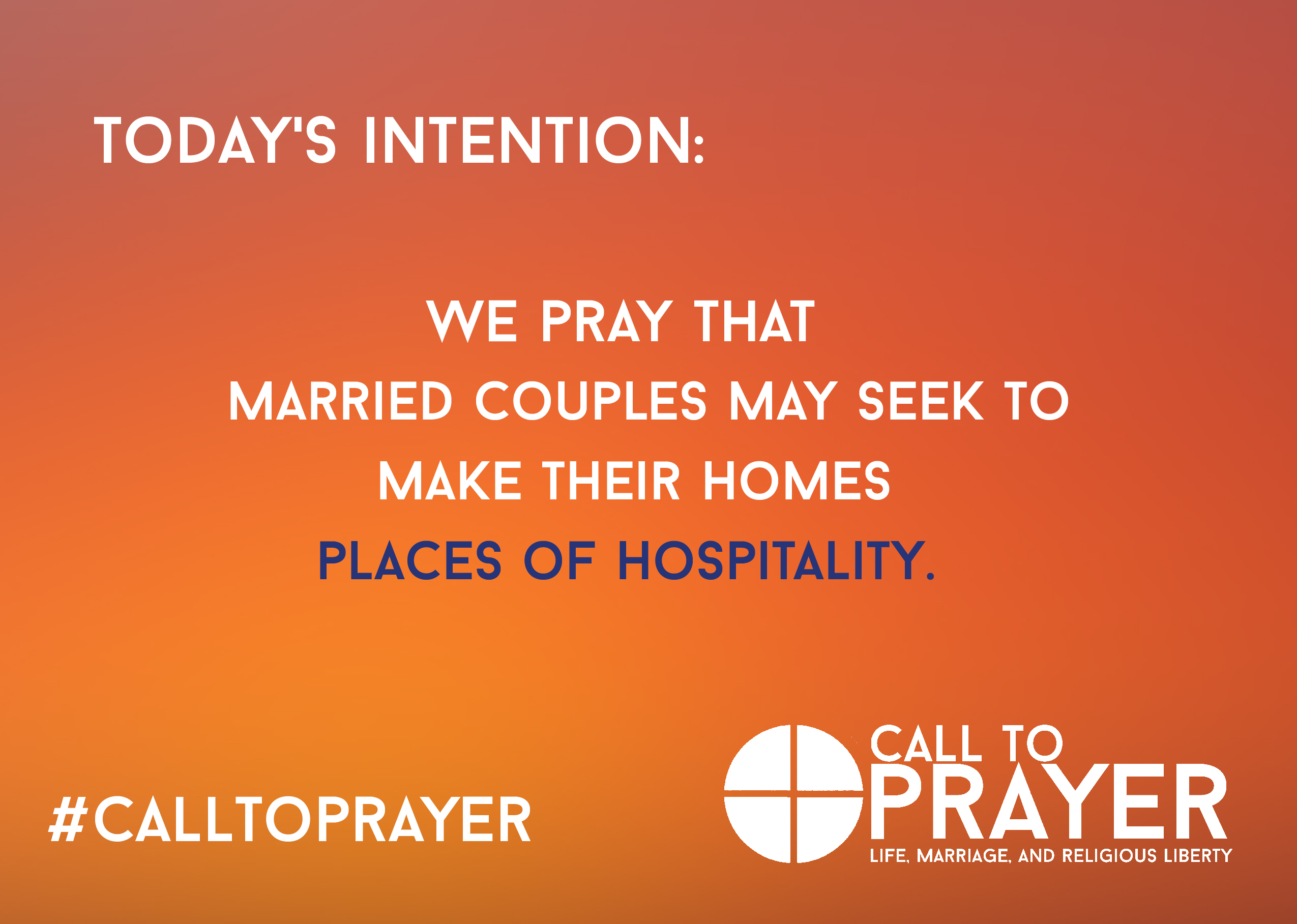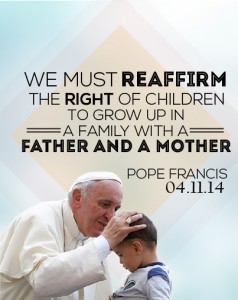Call to Prayer, April 8, 2016
Archive
Archive
Don’t be afraid to marry.
Archive
Call to Prayer: March 4
Archive
WMOF Catechesis Chapter 10: Choosing Life
World Meeting of Families Catechesis Series
The USCCB is excited about the World Meeting of Families (WMOF) being held in Philadelphia in September 2015. We are presenting a series of short articles focused on the WMOF Catechesis Love is our Mission: The Family Fully Alive and its implications for our daily lives. We will follow the timing suggested by the Archdiocese of Philadelphia by exploring one theme each month leading up to the World Meeting.
Chapter Ten: Choosing Life
Dr. Theresa Notare
Secretariat for Laity, Marriage, Family Life and Youth
Happiness in life requires courage and work. Happiness comes at a price. Want to play the guitar like a rock star? You will have to take music lessons and practice for hours daily. Want to have a strong, lean body? You will have to eat healthy food and exercise regularly. The list is endless. Hard work and sacrifice are a prerequisite to true, mature happiness.
As people of faith, we know that happiness arises from living a life that is in harmony with God’s will and leads us to fulfill our purpose. Chapter Ten of the catechism for the World Meeting of Families highlights this when it says that: “God made us for a reason… to love as He does” (no. 189). When we “understand that love is our mission,” this truth will “shape many other areas of life” (Ibid.). This can be clearly seen in marriage and family which, when founded on Christ, is a school of love.[1]
The vows in a Catholic marriage speak of the self-gift that the husband and wife make to each other in Christ. This requires “dying to self” as the two put aside “I” to become “we.” Married love, including its sexual expression, is holy. When lived in accord with God’s plan, conjugal love should “reverence God’s vision of human sexuality.”[2] This requires that the couple trust in God’s plan for their marriage, including whether and/or when they are able to have children. It may also ask for courage since Catholic couples will have to reject contraception which does harm to God’s design.
Many married Catholics do not realize the deep happiness that they can have in their marriages when God is at the center of everything. They can express God’s love for one another while they also honor His design, including their sexual lives. Sexual intercourse, as willed by God, is a holy time for husband and wife. It fortifies their union and is the worthy place for receiving new life. Honoring God’s will does not mean that couples can’t regulate the number of children in their families. When they need to postpone or avoid pregnancy, they may continue to honor God’s design by practicing one of the methods of Natural Family Planning (NFP).
NFP methods respect God’s gift of fertility by learning about it in a thoughtful way. No drugs or devices are introduced into the conjugal act; rather, the bodies of both man and woman are fully respected in their life-giving potential, and “listened” to. If a couple needs to avoid a pregnancy they refrain from sex when they are fertile. When they realize that God may be calling them to have a child, because of their knowledge of NFP they would also know the best time to attempt a pregnancy. This, of course, takes study
and practice (most NFP methods require charting the signs of fertility). All NFP methods also require self-discipline since periodic sexual abstinence is the NFP means to avoid pregnancy. This can be very difficult, but it is doable with the help of grace and the habit of self-discipline which is common to all virtues.
When couples persevere in learning and using NFP, they reap many benefits. All NFP methods are effective for both attempting to achieve or avoid pregnancy. They are also good for the body since no devices or drugs are used. In fact, NFP methods are the “organic” way to live with human fertility—they do not pollute the environment. Most importantly, NFP methods teach married couples to understand their bodies and to communicate with each other about their fertility and their relationship. These conversations can foster deeper couple communication that can improve their relationships. NFP research confirms this benefit showing that NFP couples feel respected by their spouses.[3] NFP helps married couples commit to real happiness—the deep happiness of living life according to God’s plan!
[1] See the Catechism of the Catholic Church, no. 1657.
[2] Committee for Pro-Life Activities, United States Conference of Catholic Bishops, “Human Sexuality from God’s Perspective, Humanae vitae 25 Years Later,” (1993); available at: http://www.usccb.org/issues-and-action/marriage-and-family/natural-family-planning/catholic-teaching/upload/Human-Sexuality-from-God-s-Perspective-Humanae-Vitae-25-Years-Later.pdf.
[3] L. VandeVusse, L. Hanson, R. J. Fehring, A. Newman, J. Fox, “Couples’ views of the effects of natural family planning on marital dynamics,” Journal of Nursing Scholarship 35, no. 2 (2003):171-176.
Archive
Chapter 9- Mother, Teacher, Family: The Nature and Role of the Church
World Meeting of Families Catechesis Series
The USCCB is excited about the World Meeting of Families (WMOF) being held in Philadelphia in September 2015. We are presenting a series of short articles focused on the WMOF Catechesis Love is our Mission: The Family Fully Alive and its implications for our daily lives. We will follow the timing suggested by the Archdiocese of Philadelphia by exploring one theme each month leading up to the World Meeting.
Chapter Nine: Mother, Teacher, Family: The Nature and Role of the Church
Dr. Andrew Lichtenwalner
Secretariat of Laity, Marriage, Family Life and Youth
What’s in an Image?
The ninth chapter of the World Meeting of Families preparatory catechesis, “Mother, Teacher, Family: The Nature and Role of the Church,” begins in the following way: The Church has institutional forms because she must work in the world. But that does not exhaust her essence. The Church is the Bride of Christ, a “she,” not an “it.”
What do we think of when we hear the Church described as “Bride” and “Mother”? What’s our first impression? Does it have anything to do with us?
My mom and dad raised me in the Catholic faith and encouraged a love for the Church from my earliest years. I don’t recall them speaking about the Church as “Mother” at home the way they talked of God as “Father,” but I think they conveyed that sense to me very naturally and practically in the way they lived the faith—love for Christ and love for the Church go together.
I remember during grad school coming across the work of Henri de Lubac, a French Jesuit theologian who was later made a Cardinal by Pope St. John Paul II. De Lubac had a great love for the image of the Church as Mother. In seeking to perceive and grasp the nature of the Church, his personal experience led him to describe in a simple, childlike way “the first of all words: the Church is my mother.” He said that the two words “Mother Church” (Ecclesia mater) express “the very reality of Christian life.”
How can the very reality of Christian life be conveyed by calling the Church our Mother? Because the Christian life is conceived and generated by her and lived in and through her. There is no Christian life without the Church.
To call the Church our Mother, which Pope Francis himself has done on many occasions, is not a mere pious expression or sentimentality. Christian discipleship hinges on the Church being our Mother, and the Church is only Mother because she is first the Bride of Christ. Encountering and following Jesus depends first and always on grace, which we receive from the Lord through the Church. The Church can only be fruitful in discipleship and truly a Mother if she is united to Christ, close to Him as His Bride. Without Him, we can do nothing.
The Church was loved into existence by Christ. The Fathers of the Church saw the Church being formed like the New Eve, drawn out of the pierced side of Christ on the Cross. The Church is not a haphazard byproduct or afterthought of the saving work of Christ but the intended fruit of Christ’s mission of redemption manifest with the Descent of the Holy Spirit at Pentecost. The world was created for the Church, the Bride of Christ, who as Mother would be the place of re-creation and regeneration in the Spirit.
In other words, Christ and the Church are inseparable. A Christian artist has expressed it well, saying that in Christ’s words: “You cannot care for Me, with no regard for her. If you love Me, you will love the Church.”
The image of the Church as the Bride of Christ, in addition to the image of the Church as the Body of Christ, powerfully conveys the mystery of the intimate union between Christ and the Church. The image of the Church as Mother conveys the fruitfulness that comes from being united in and with Christ. These images not only concern us but are about us. We are the Church in a real way. We are called to bear Christ to the world. As St. Augustine said to encourage Christians to live up to their identity: Be the bride.
As sinners, we know that we are in need of grace and do not always live up to the gift of holiness which marks the Church. The images of the Church as Bride of Christ and Mother encourage us to “press towards the mark” and to understand Christian discipleship as inseparable from loving the Church.
Even if we haven’t given the images of the Church as Bride of Christ and Mother much thought before, if we love the Church as Christ does, we are already living those images.
Archive
Spiritual Accompaniment: Evangelii Gaudium
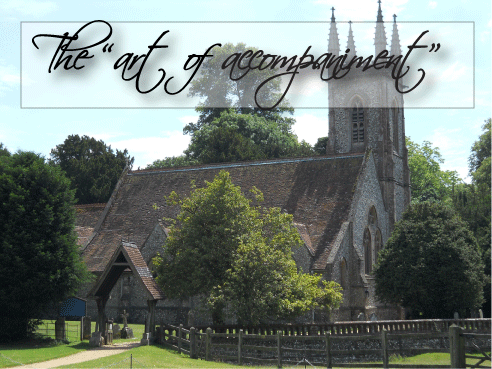 Lessons from Evangelii Gaudium #12
Lessons from Evangelii Gaudium #12
Pope Francis’s Apostolic Exhortation on the proclamation of the Gospel in today’s world, Evangelii Gaudium or “The Joy of the Gospel,” has many points that are relevant to the work of Marriage: Unique for a Reason. This series will explore some of these themes and apply Pope Francis’s words to the culture of marriage and family in the United States.
Spiritual Accompaniment (nos. 169-173)
In evangelization, part of our task is to provide the attentive and loving presence of Christ to others, which entails being fully aware of and present often as we can. Pope Francis points out that our culture is “paradoxically suffering from anonymity and at the same time obsessed with the details of other people’s lives, shamelessly given over to morbid curiosity” (no. 169). In both of these cases—not knowing our next door neighbors but knowing all the details of our friend’s dinner from Facebook – we inadequately recognize the other people as unique children of God, with all of their particular needs, struggles, and gifts to offer. The culture is in dire need of Christ’s “closeness and his personal gaze” (no. 169). It is not only the task of ordained ministers and pastoral workers to make this presence known to others; instead, Pope Francis reminds us we must all be initiated into this “art of accompaniment” (no. 169). The clergy and the laity alike must foster a proper disposition towards others that “teaches us to remove our sandals before the sacred ground of the other” (cf. Ex 3:5).
While sufficient attention must be given to those whom we are accompanying spiritually, Pope Francis warns against a lapse into “a sort of therapy supporting their self-absorption” (no. 170). We must keep in mind that each individual achieves true freedom only in God, while sin binds us and makes us a dim version of who we are. Our path of accompaniment must be therefore be likened to a “pilgrimage,” towards the Father in a life of virtue (no. 171). We cannot condone wrong actions or encourage people to focus on themselves alone. Attainment of virtue is a process, a habitus that requires much patience and correction.
The Holy Father encourages “the art of listening, which is more than simply hearing,” as the best way to show our respectful and compassionate presence on the journey (no. 171). By listening we are reminded of the mystery of each person in their relationship to God. We can never know everything about this relationship from the outside. Because of this, we must always aid and correct others by recognizing and helping them to realize “the objective evil of their actions, but without making judgments about their responsibility and culpability” (no. 172). Through listening, prudence, and our own experience, we will come to learn the best ways in each situation to gain trust and encourage growth.
“Genuine spiritual accompaniment always begins and flourishes in the context of service to the mission of evangelization,” and this mission starts within the family (no. 173). Marriage is to be a place of spiritual accompaniment, where respect and compassion for one’s spouse abides. Being open with each other about your faults and failings in virtue, always with prudence and kindness, can be an opportunity for growth. Many married couples attest that no matter how well you know your spouse, they are still always a mystery. Make this week one in which you embody the art of listening.
Archive
Evangelii Gaudium, Marriage and Family: Part Two
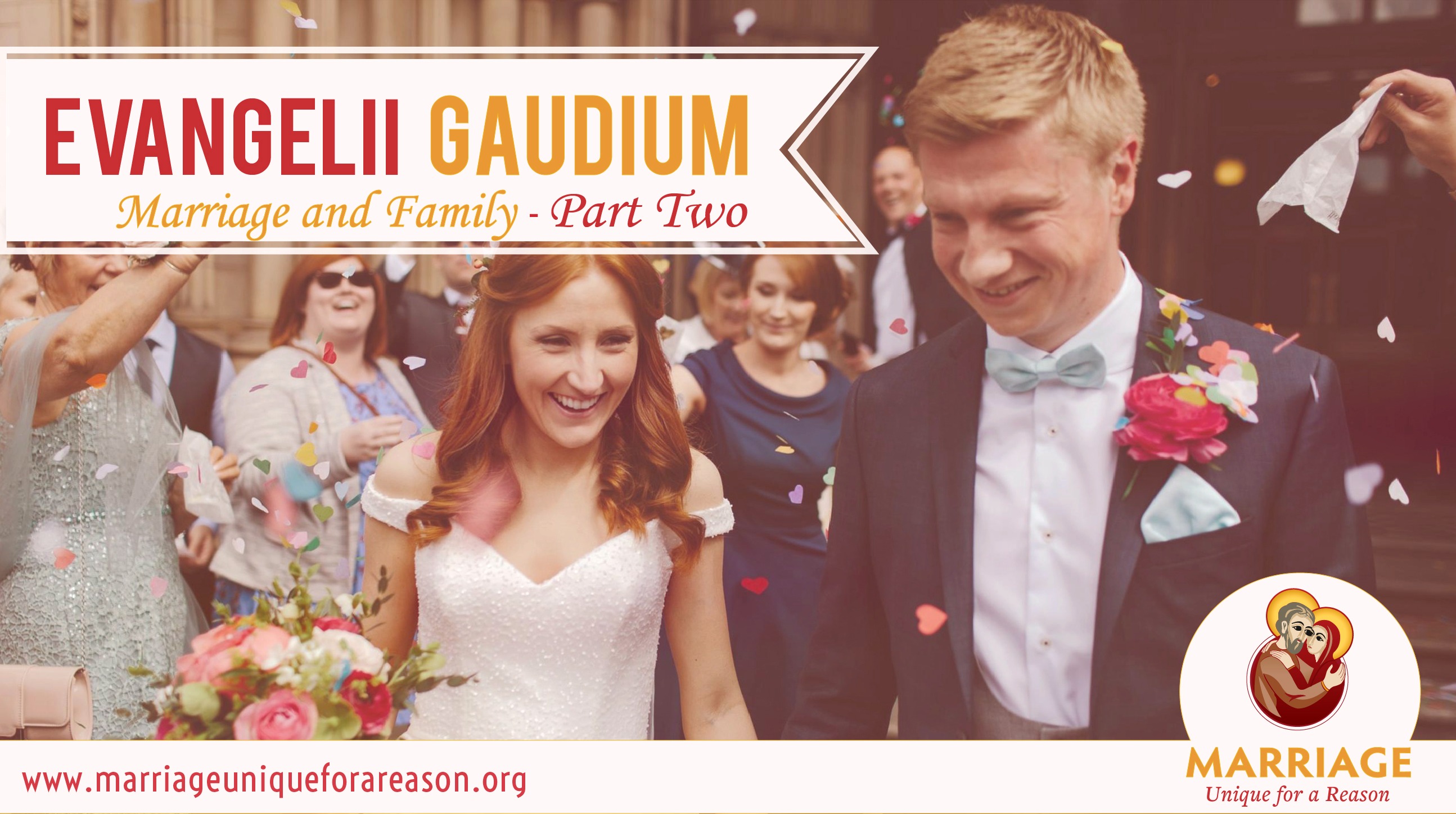 Pope Francis’s Apostolic Exhortation on the proclamation of the Gospel in today’s world, Evangelii Gaudium or “The Joy of the Gospel,” has many points that are relevant to the work of Marriage: Unique for a Reason. This series will explore some of these themes and apply Pope Francis’s words to the culture of marriage and family in the United States.
Pope Francis’s Apostolic Exhortation on the proclamation of the Gospel in today’s world, Evangelii Gaudium or “The Joy of the Gospel,” has many points that are relevant to the work of Marriage: Unique for a Reason. This series will explore some of these themes and apply Pope Francis’s words to the culture of marriage and family in the United States.
From the Heart of the Gospel
Pope Francis writes in this section about how the deep and beautiful truths of the Gospel are often not communicated effectively in the modern world because of the focus of mass communications on the controversial or difficult moral teachings. He calls the pastoral ministers of the Church to concentrate instead on, “the essentials, on what is most beautiful, most grand, most appealing and at the same time most necessary” (no. 35).
 Christian Marriage, which takes into account the basic human desire to love and be loved, to give life and receive it, is certainly one of the most beautiful and appealing aspects of the Gospel. Marriage is essentially a response to a love that precedes it— God’s love. “For God so loved the world…” (John 3:16) that Christian spouses are able to love one another with His own love.
Christian Marriage, which takes into account the basic human desire to love and be loved, to give life and receive it, is certainly one of the most beautiful and appealing aspects of the Gospel. Marriage is essentially a response to a love that precedes it— God’s love. “For God so loved the world…” (John 3:16) that Christian spouses are able to love one another with His own love.
The Gospel transforms daily life; it enlivens our hearts with hope and trust in God. We experience the Holy Spirit through joy and peace, generosity and service. God is visible in gatherings of families—children running around playing while the adults converse, for example, and in religious communities—working together with smiles and unruffled patience. These are witnesses to the faith that are “most appealing and at the same time most necessary.”
Why most necessary? Because there is fear in the modern heart. Getting married and raising a family based on Christ’s love has always been a daunting though enriching task embraced by many young people, but today many young people are delaying marriage or even not getting married at all. The most recent Pew research study, for example, showed that a record number of young adults in America are unmarried and that many young people do not see marriage as a priority. Cohabitation has increased, more children are born out of wedlock, and divorce is fairly common. 
In these circumstances, the Gospel of the Family in the context of “the harmonious totality of the Christian message” (no. 39) is ever more necessary. Men and women need to hear and see that God can do even what seems impossible: bond two flawed human beings together for life, in love and fidelity. This is “the fragrance of the Gospel” (no. 39). Married couples, young and old, share your love visibly and inspire young people with your witness of fidelity!
Thank you for reading the second post of our Evangelii Gaudium – Marriage and Family blog post series. We hope you enjoyed it. Please stay updated through our blog and social media sites for future blog post! Click on the image below to be directed to all published articles within the Evangelii Gaudium blog series.
Archive
Call to Prayer: September 26
Archive
Friday Fast: August 29
Archive
Courage Film
Check out the new film made by Courage that includes the witness of three people with same-sex attraction.
Archive
Pope Francis on Children’s Rights
Pope Francis offered a very clear message today to members of BICE (International Catholic Child Bureau), a Catholic NGO that works to protect the rights and dignity of the child worldwide:
“On a positive note, we must reaffirm the right of children to grow up in a family with a father and a mother capable of creating a suitable environment for the child’s development and emotional maturity.”
Click here for his full address.
Archive
Friday Fast: April 11
Intention: We pray for a deeper understanding of what it means to be created male or female.
Reflection: During a recent morning meditation, Pope Francis reflected on the Book of Genesis. “The creation of man and woman is the masterpiece of creation,” the Pope explained. God “did not want for man to be alone: he wanted him to be with his companion, his companion on the journey.”
Here the Bible shows us a very important truth; man and woman are equal, but different. This sexual difference is actually complementary. It is through the existence of woman that we are able to fully appreciate the uniqueness of man and vice versa. An example of this aspect of difference and complementarity can be seen in beautiful paintings where two complementary colors are used. When brought together, the two different colors look more vibrant and unique than they would have looked separately. The same can be said of man and woman. In the words of Blessed John Paul II, “femininity in some way finds itself before masculinity, while masculinity confirms itself through femininity.”
Did You Know? In his Theology of the Body, Blessed John Paul II explained that “man became an image of God not only through his own humanity, but also through the communion of persons, which man and woman form from the very beginning.” Through marriage, a husband and wife are able to be a true communion of persons by giving themselves and receiving the other in unselfish love. In this way, a husband and wife have the unique ability to reflect Trinitarian Love.
Archive
“Marriage is the icon of God’s love for us”
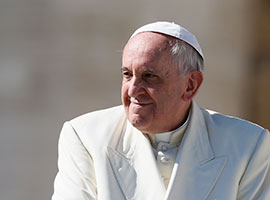 Today, Pope Francis concluded his Wednesday catechesis on the Sacraments with a reflection on marriage. He began by explaining that marriage is “A sacrament that leads us to the heart of God’s plan, which is a plan of alliance with his People, with all of us, a plan of communion.” He then explained, “The image of God is a married couple, man and woman, not only man, not only woman, but rather both. This is the image of God: love, God’s alliance with us is represented in the alliance between man and woman.”
Today, Pope Francis concluded his Wednesday catechesis on the Sacraments with a reflection on marriage. He began by explaining that marriage is “A sacrament that leads us to the heart of God’s plan, which is a plan of alliance with his People, with all of us, a plan of communion.” He then explained, “The image of God is a married couple, man and woman, not only man, not only woman, but rather both. This is the image of God: love, God’s alliance with us is represented in the alliance between man and woman.”
“We were created to love, as a reflection of God and his love. And in matrimonial union the man and woman realize this vocation, as a sign of reciprocity and the full and definitive communion of life.” When a man and a woman receive the Sacrament of marriage, “God is, so to say, ‘mirrored’ in them, he imprints in them the features and indelible nature of His love. Marriage is the icon of God’s love for us. Indeed, God too is communion: the three Persons of the Father, the Son and the Holy Spirit have always lived and live forever in perfect unity. And this is the mystery of marriage: God makes married couples into one existence. The Bible uses a strong term: it says one ‘flesh’ only, so intimate is the union between man and woman in marriage.” Pope Francis then concluded his catechesis by saying, “Married life is beautiful, and must be protected.”
Let us pray together for the courage to continue to protect the truth of marriage as the union of one man and one woman!
Archive
“The Masterpiece of Creation”
Pope Francis recently reflected on the Gospel reading of Mark in which the Pharisees, wishing to put Jesus to the test, asked him whether it is lawful to divorce. The Pope reminded his listeners that Jesus “goes right back to the days of creation.” Jesus explains, “But from the beginning of creation, God made them male and female; ‘For this reason a man shall leave his father and mother and be joined to his wife, and the two shall become one. So they are no longer two but one flesh.’”
Pope Francis had much to say about this event and explained quite beautifully that “the Lord is here referring to the masterpiece of creation.” For God “created the light and saw that it was good.” Then “he created the animals, the trees, and the stars: all good.” But “when he created man” he said “that he was very good.” Pope Francis continued, “the creation of man and woman is the masterpiece of creation.” Also because God “did not want for man to be alone: he wanted him to be with his companion, his companion on the journey.” Pope Francis then explained that this moment was also “the beginning of love.” However, he added that “the Lord’s masterpiece was not finished there…the Lord holds up this love contained in the masterpiece of creation in order to explain the love he has for his people. Yet there is another step: when Paul needs to explain the mystery of Christ, he also does so in relation and in reference to the bride. For Christ is wedded: he wedded the Church, his people; as the Father had wedded his people Israel, so Christ espoused his people to himself.”
All of this, the Pope concluded, brings to mind the “plan of love”, “the journey of love of Christian marriage, which God blessed in the masterpiece of his creation with a blessing that can never be taken away. Not even original sin destroyed it.” And “when one considers this,” he quite naturally sees “how beautiful love is, how beautiful marriage is, how beautiful the family is, how beautiful this journey is.”
For Pope Francis’ full reflection, click here.
Archive
Friday Fast: March 28
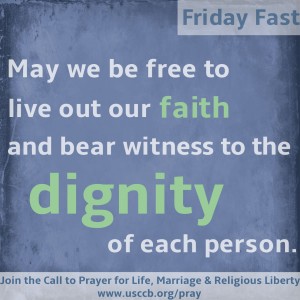 Reflection: “Pope Francis has observed that ‘religion [cannot] be relegated to the inner sanctum of personal life, without influence on societal and national life.’ …Every Christian is called to practice charity in a manner corresponding to his or her vocation. Some Catholics, like the Little Sisters of the Poor who run nursing homes for the elderly poor, devote their entire lives to helping others and embrace a vow of poverty themselves” (Archbishop Kurtz).
Reflection: “Pope Francis has observed that ‘religion [cannot] be relegated to the inner sanctum of personal life, without influence on societal and national life.’ …Every Christian is called to practice charity in a manner corresponding to his or her vocation. Some Catholics, like the Little Sisters of the Poor who run nursing homes for the elderly poor, devote their entire lives to helping others and embrace a vow of poverty themselves” (Archbishop Kurtz).
Yet the HHS mandate compels objecting employers to provide coverage for drugs and devices which are against their consciences and threatens the ministries of the Little Sisters of the Poor and many others.
As this and many other lawsuits progress, let us continue our prayer efforts for the protection of the religious freedom so we may practice charity and live out our faith without penalty.
Did You Know? This Tuesday, the Supreme Court heard oral arguments in two cases brought by families who are seeking protection of their religious freedom.
Archbishop Joseph Kurtz, president of the U.S. Conference of Catholic Bishops, shares comments in his op-ed, “Will the Owners of Hobby Lobby Have to Check Their Faith at Their Own Door?”
Archive
The Annunciation and Freedom
“Behold, I am the handmaid of the Lord. May it be done to me according to your word.” (Luke 1: 38).”
Today we celebrate that great event when the Angel Gabriel visited Mary and asked her to be the Mother of God. The Annunciation is a huge solemnity in the Church because it commemorates that moment when God took on human flesh. This day exemplifies God’s love for us in so many ways. All throughout the Old Testament we read about examples when God’s love was rejected by His people. Time and time again, He offered opportunities to accept His love, all the while, allowing His people to choose Him freely (or not choose Him as was often the case). Mary’s fiat or “yes” is celebrated because unlike anyone in history before her, she was completely and unreservedly open to God’s will in her life.
The event of the Annunciation teaches us a great deal about freedom. Often times, when we think of freedom, we see it as the ability to choose between “a” or “b,” without any pressure or influence to choose either one. We often believe that such an influence would be considered an infringement on our freedom. But when we look closer, this view of freedom is devoid of all truth. It assumes there is no difference between the options “a” and “b” and that the only good is the ability to choose. It never considers what is being chosen.
Authentic freedom, on the other hand, is shaped by truth. In the words of John Paul II, “Truth enlightens man’s intelligence and shapes his freedom.” Apart from truth, freedom cannot exist. Take for example persons considered “free” to “express their sexuality” through the use of pornography, a medium that completely disregards the truth of human dignity and what human sexuality is made for. Through this addicting “expression,” a person can quickly become a slave to the sin of pornography. Contrarily, we are most free when we are living according to the truth of our existence. Because she had never been touched by the stain of sin, Mary was completely free to embrace the will of God. She was completely free to live the life she was made to live.
Another lie society tells us is that our ability to choose is simply that, our choice. No one else needs to be involved and no one else should matter. We are autonomous, self-determining individuals, so the theory goes. The Annunciation shows us this is not the case. Mary’s willingness to participate in the event of the Incarnation has affected all of history. All of creation waited in anticipation of Mary’s “Yes.” We are all sharers in the benefit of Mary’s decision to choose the will of God. No choice we make is ever merely personal because we are all connected through our common humanity.
Finally, the Annunciation shows us that we can never truly separate faith and life. This is sometimes difficult to accept, especially within a culture that emphasizes the importance and necessity of separating “Church and state.” Today, it is considered normal to be “personally opposed” to something, but okay with it happening in the public realm. Our Catholic faith is different, however. There is no distinction between the public and private realm when it comes to living out our faith. Everything we do, whether it be eating, sleeping, talking or reading, should be done with an eye to who we are as created beings and why God made us. The Incarnation shows us that the physical matters. Salvation history occurs within history, it is a physical event.
There is a poem by Rev. John Duffy, C.S.s.R. which describes Mary’s first awakening after the Angel Gabriel appeared to her. In describing Mary, the poem explains “She was the Mother of the wandering Word, little and terrifying in her laboring womb. And nothing would again be casual and small, but everything with light invested (italics mine).” The Incarnation displays for us how involved God is in our daily lives. “For God so loved the world that He gave His only begotten Son (John 3:16).” He is not some distant God who creates us and leaves us to figure things out on our own. Instead, God is invested in our lives at every moment. He holds us in being through love, in love, and for love. As John Paul II explained, “man remains a being that is incomprehensible for himself, his life is senseless, if love is not revealed to him, if he does not encounter love (Redemptor Hominis, no 10).” So nothing we do should be separated from this realization that God is Love and desires each of us to be united with Him in Love. When we realize this, “nothing [will] again be casual and small.”
Archive
Friday Fast: March 21
Intention: We pray for all fathers, that through the example of St. Joseph, they may fully embrace their vocation and accept the privilege and responsibility of caring for their children as St. Joseph cared for Jesus.
Reflection: On Wednesday, we celebrated the Solemnity of Saint Joseph. In his Apostolic Exhortation, “The Guardian of the Redeemer,” John Paul II referred to St. Joseph as “the guardian and cooperator in the providential mystery of God (no 14).” He explained that together with Mary, Joseph was the first guardian of Christ: “St. Joseph was called by God to serve the person and mission of Jesus directly through the exercise of his fatherhood (no 8).”
It is interesting to note that St. Joseph’s fatherhood and specific role in the plan of salvation would not have been possible apart from his marriage to Mary: “Joseph’s fatherhood – a relationship that places him as close as possible to Christ…comes to pass through marriage to Mary, that is, through the family (no 7).” Let us pray that every husband and wife will be brought closer to Christ through their marriage to one another.
A further reflection on St. Joseph’s participation in the plan of salvation can be found here.
Did You Know? Pope Francis has a deep devotion to St. Joseph. Last year, he chose the Solemnity of St. Joseph as the date for his inaugural Mass. A sign of Pope Francis’ devotion to this Saint can be seen on his coat of arms. Next to the star representing Mary is the spikenard flower, which is often used to represent St. Joseph.
Archive
Solemnity of St. Joseph
Among Saint Joseph’s many titles such as “mirror of patience”, “lover of poverty”, “terror of demons”, “pillar of families”, a particularly interesting one is “the guardian of the mystery of God.” In his Apostolic Exhortation Redemptoris Custos, John Paul II emphasized the importance of this title and the role St. Joseph was given to play in God’s plan of salvation.
Joseph was one of the first to share in the mystery of the Incarnation with Mary. This “sharing” was in a real way an actual participation in Mary’s “yes” at the Annunciation. In taking Mary as his wife instead of divorcing her, “what Joseph did united him in an altogether special way to the faith of Mary. He accepted as truth coming from God the very thing that she had already accepted at the Annunciation (no 4).” Mary and Joseph were one in their desire to follow the Will of God. In a particular way, Joseph silently and courageously took upon himself the many sufferings that Jesus and Mary would bear over the years. Whether by accepting the mysterious nature of Mary’s pregnancy, making the long journey to Bethlehem with no place to stay, and later escaping into Egypt to save Jesus’ life, Joseph fully embraced the supreme honor and responsibility of caring for Mary and Jesus.
It is important to note that Joseph’s fatherhood is tied to his marriage with Mary. In fact, “Joseph’s marriage to Mary is the juridical basis of his fatherhood (no 7).” God chose to have His only Son enter the world in a family. In the beginning of the Old Testament, we are told of a married couple, Adam and Eve, through whom “the source of evil was unleashed on the world (no 7).” It seems fitting therefore, that God would desire to bring salvation to the world through the marriage of Mary and Joseph. In this way, “the savior began the work of salvation by this virginal and holy union, wherein is manifested his all-powerful will to purify and sanctify the family – that sanctuary of love and cradle of life (no 7).”
Through Christ’s being born into and growing up in a family, we see the importance placed upon marriage and the family within salvation history. Each family today is given the opportunity to imitate the Holy Family and therefore participate in salvation history in a distinct way. Each family is a “domestic Church” where, as Pope Francis explained, “we learn to live with others despite our differences and to belong to one another; it is also the place where parents pass on the faith to their children (Evangelii Gaudium, no 66).” Each family is also given the opportunity to ask St. Joseph to guard and protect them as he guarded and protected Mary and Jesus. Let us never hesitate to ask this powerful saint to intercede on behalf of our families. St. Joseph, pray for us!
March 19, 2014
Archive
Friday Fast: March 14
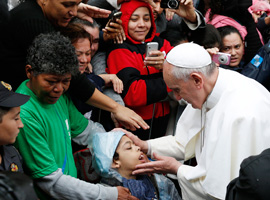 Intention: Marking the one-year anniversary of Pope Francis’ election this week, we pray that we may follow his humble example and better love “our brethren, especially the weakest and neediest” (Pope Francis, April 24, 2013).
Intention: Marking the one-year anniversary of Pope Francis’ election this week, we pray that we may follow his humble example and better love “our brethren, especially the weakest and neediest” (Pope Francis, April 24, 2013).
Reflection: A year ago this week, Pope Francis captivated the world almost immediately with his humble simplicity, charisma and warmth. Throughout the past year, he has continued to teach us both by his example and his words, inspiring us to look beyond ourselves and encouraging us to “go in search of the people who are the very flesh of Christ” (Vigil of Pentecost, 2013).
In the message from Pope Francis for last year’s Day of Life, we are reminded that “even the weakest and most vulnerable, the sick, the old, the unborn and the poor, are masterpieces of God’s creation, made in his own image, destined to live for ever, and deserving of the utmost reverence and respect.”
Let us ask the Lord how He is calling us to love all of our brothers and sisters, especially the weakest and neediest, and follow where He leads.
Did You Know? The Vatican website features an online book of images and quotes from Pope Francis over the last year.
